新概念1册-117课-课件加练习
Lesson117(课件)新概念英语第一册
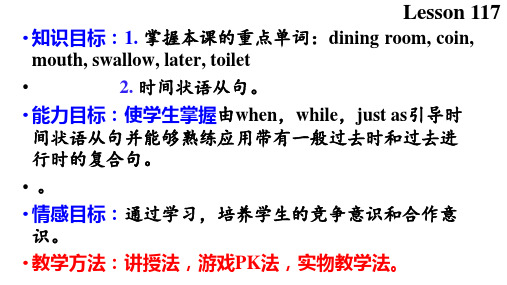
翻译下列句子。 • 1. 当我到达时,她正在做饭。 • When I __a_r_ri_v_e_d_, she_w_a_s___ _c_o_o_k_in_g_ a meal. • 4. 当我读书时,我妈妈正在做饭。 • _W__h_i_le____I was reading , • my mother __w_a_s_____ __c_o_o_k_i_n_g_____.
• A. him B. his
C. himself D. it
• (A) 4. Have you ever _______ Shenzhen?
• A. been to B. gone to C. went to
D. gone in
• (C ) 1. When he _______ I _______ a bath.
do housework
phone me from the office
一、选择题
• (C) 1. I _______ my pen everywhere but I couldn’t _______ it.
• A. looked for, found
B. found, looked for
• C. looked for, find
•。
• 情感目标:通过学习,培养学生的竞争意识实物教学法。
翻译下列句子。 • 1. 当我到达时,她正在做饭。 • When I ________, she______ _______ a meal. • 2. 当我读书时,我妈妈正在做饭。 • _________I was reading , • my mother _________ _____________.
While ... have breakfast, Tommy, find two small coins
新概念英语第一册第117-118课课件-精心修改

Key words&expressions
★dining room • dining table • sitting room / living room • bedroom • kitchen • balcony • garden
饭厅,餐室 餐桌 客厅 卧室 厨房 阳台 花园
Key words&expressions
A. had B. having C.was having D.is having KEY: C
3. While we ___ (wait) for the bus, a girl ___(run) up to us.
4. I ___ (telephone) a friend when Bob ___ (come) in.
Language points
2. there were coins everywhere.
复合不定代词
Every
No
Any
Some
One Thing Body
Everyone No one Everything Nothing Everybody Nobody
Anyone Someone Anything Something Anybody somebody
while
When Joe was reading a book,Carfield was watching TV.
Grammar
1.构成 • was/were +现在分词
过去进行时
• 疑问句式 把 was/were 提前
• 否定句式 在 was/were 的后面加 not
• 例:
Grammar
1. While she ___ TV, Penny ___ asleep.
新概念英语第一册117课

1.While she TV,Penny-asleep-A.watches,was falling-B.w s watching,fell-c.was watching,was falling-D.watch,fe l-Practice Time-KEY:B-1名是2浴子~~
2.Penny-dinner when she cut her-fingers.-A.had-B.havi g-c.was having-D.is having-KEY:C-o-CHEES-31启是A2站浴子~~
e败合erS8aa1-Dining room hall-饭厅
Living room-起居室,客厅-Bedroom-oto:-卧室-ToY Box
Bathroom-洗浴室,卫生间-Better Homes and Gardens.-S为o0aL3龙co -solutions-Kitchen-厨房-INCLUDED
3.While we-waitfor the bus,a-girl runup to us.-4.-I t lephonea friend when-Bob comein.-5.While mother-put-C thy to bed,the door bell-ring.-6.Jane-waitfor me when I arrive.-7.Mike and I playbasketball at-that time ye terday afternoon.-1子是2站浴子
Time for listening!
AY-概念:-1、在过去某个特定的时间正在进-过去进行时-行或发生的动作-2、当过去的一个动作发生的时候E-另外一个动作正在进行。-造-2B141-欲哈lcb
结构-1、肯定句:主语+was/were+现在-分词-was having-breakfast-2、否定句 -主语+was/were not+现-在分词-They were not watching TV.-3、疑 句:wletter last night?
新概念英语第一册Lesson117-118笔记(语法点+配套练习+答案)

put ... into ...
把...放到
have/has been to
曾去过某地
四、语法解析
1.现在进行时:说话此刻正在发生
结构:be (am/is/are) + v.ing
时间标志词:Look! Listen! now, at the moment
练习:
1.One of themis taking(take) photos for us now.
11.Didyoufinish(finish) your homework yesterday?
12.Her motherdidn’t give(not give) the girl any present.
13.When hewent(go) back to England, hewass(be) very tired.
The childrenwereallhappy.
Bothof the twins wanted to go to the theatre.
Allof my classmates are invited to my party.
three times三次
现在完成时的标志词
twice两次
once一次
have/has been to去过某地,已回
have/has gone to去了某地,未回
My father isn't at home, hehas gone toBeijing.
Mr Wang isn't here.Hehas gone toQingdao.
My fatherhas been toBeijing twice.
Ihaveneverbeen tothe Great Wall.
新概念英语第一册课后练习题及答案117-118
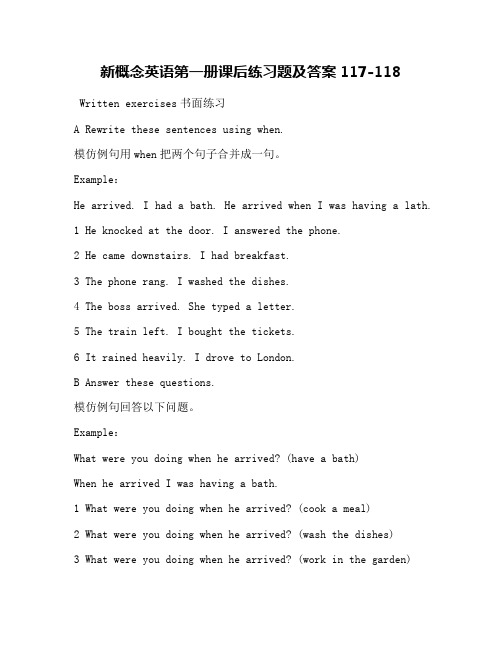
新概念英语第一册课后练习题及答案117-118Written exercises书面练习A Rewrite these sentences using when.模仿例句用when把两个句子合并成一句。
Example:He arrived. I had a bath. He arrived when I was having a lath.1 He knocked at the door. I answered the phone.2 He came downstairs. I had breakfast.3 The phone rang. I washed the dishes.4 The boss arrived. She typed a letter.5 The train left. I bought the tickets.6 It rained heavily. I drove to London.B Answer these questions.模仿例句回答以下问题。
Example:What were you doing when he arrived? (have a bath)When he arrived I was having a bath.1 What were you doing when he arrived? (cook a meal)2 What were you doing when he arrived? (wash the dishes)3 What were you doing when he arrived? (work in the garden)4 What were you doing when he arrived? (type letters)5 What were you doing when he arrived? (shave)6 What were you doing when he arrived? (boil the milk)7 What were you doing when he arrived? (phone my sister)8 What were you doing when he arrived? (dust the bedroom)C Answer these questions.模仿例句回答以下问题。
新概念英语第一册117课 课件(共17张PPT)
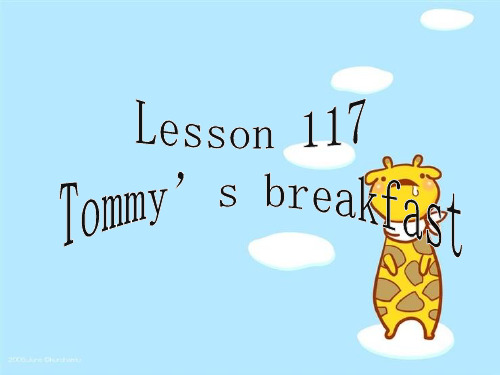
• 5. The train left when I was buying the tickets.
• 6. It rained heavily when I was driving to London.
A. is having B. have C. has D. was having
4. What ____ you ____from 7 to 9 yesterday ? A. were, doing B. did. do C. have, done
5.Look! Lily with her sister __ a kite on the playground.
shaving
cut
Exercise P239
• 1. He knocked at the door when I was answering the phone.
• 2. He came downstairs when I was having breakfast.
• 3. The phone rang when I was washing the dishes.
过去进行时VS现在进行时
结构
现在am/is/are+v-ing 过去was/were+v-ing
The students are drawing pictures now.
The students were drawing pictures when the teacher came in.
3.时间状语:
New words and expressions
dining room
新概念英语第一册第117-118课课件
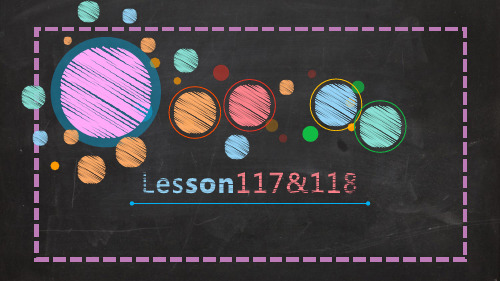
1. 过去进行时的肯定式: 主语+was/were + 动词的现在分词
2. 过去进行时的否定式: 主语+was/were not +动词的现在分词
3. 过去进行时的疑问式: Was/Were + 主语+ 动词的现在分词?
肯定句:We were having supper when the phone rang.
Chinese Breakfast
油条 水饺 蒸饺 馒头 饭团 蛋饼 豆浆 稀饭 白饭 蛋炒饭 米粉 馄饨面 酸辣汤
fried bread stick boiled dumplings steamed dumplings steamed buns rice and vegetable roll egg cakes soybean milk rice porridge plain white rice fried rice with egg rice noodles wonton & noodles hot and sour soup
★ toilet n. 厕所,盥洗室
bathroom/washroom/ restroom
lavatory/'lævətəri/
public conveniences 委婉用语(英)
comfort station
ቤተ መጻሕፍቲ ባይዱ
委婉用语(美)
Water Closet (wc) 委婉用语(欧)
toilet paper/ toilet roll 卫生纸
from hand to mouth
勉强糊口
from mouth to mouth
口口相传的
have a big mouth
新概念英语第一册第117课课件讲课讲稿

117课 过去进行时练习: 一、仿照例句用所给 的词汇造句。
1. I, see him, he, cross the street I saw hi m while he was crossing the street. (He was crossing the street when I saw him.) A. the sun, shine, we, come out B. she, study at college, the war, break out C. she, work in a factory, the city, be liberate d (放) D. he, lose his pen, he, go sightseeing in th e city
阅读课文回答问题
What does the she mean by ‘change’ in the last sentence ?
再看一遍课文
When my husband was going into the dining room this morning
he dropped some coins on the floor.
定语从句的先行词是名词或代词;而同位语从句的先行词只能是 名词,而且仅限于idea,plan,fact,theory,promise,hope, news,doubt,truth,information,suggestion,question, thought,belief,conclusion等少数名词。
本课语法同位语
同位语,代表一个名词(或其它形式)对另一个名词或代词进行 修饰,限定或说明。同位语与被它限定的词的格要一致,并常常紧 挨在一起。
由两个或两个以上同一层次的语言单位组成的结构,其中前项与 后项所指相同,句法功能也相同,后项是前项的同位语其中常用 ‘and’连接。
新概念英语第一册第117-118课课件(全).ppt

• A. The other B. The others C. Another
D. Others
• 8. This is not the only answer to the question. There are _____.
• A. the others B. others C. another
D. the other
• 9. Please give me ____ chance.
• A. other B. the other C. another
D. the others
• 10. He was a wonderful teacher. Everyone agreed it would be hard to find ____ like him.
• 4. Jim! _________ is waiting for you at the school gate.
• 5. In spring, _________ begins to grow.
• 6. There is _________ knocking at the door. Please go and see who it is.
D. Another
• 3. This cake is delicious! Can I have ______ piece, please?
• A. other B. another
C. others
D. the other
• 4. Where are _____ boys?
• A. the other B. the others C. others
practice
1.There’s no _____ way to do it.
新概念英语第一册第117课(课堂PPT)

117课 过去进行时练习: 一、仿照例句用所给 的词汇造句。
1. I, see him, he, cross the street I saw hi m while he was crossing the street. (He was crossing the street when I saw him.) A. the sun, shine, we, come out B. she, study at college, the war, break out C. she, work in a factory, the city, be liberate d (放) D. he, lose his pen, he, go sightseeing in th e city
17
1. While we __________ (wait) for the bus, a girl __________ (run
) up to us.
2. I __________ (telephone) a friend when Bob __________ (com
e) in.
3. Jim __________ (jump) on the bus as it __________ (move) aw
1
阅读课文回答问题
What does the she mean by ‘change’ in the last sentence ?
2
再看一遍课文
3
When my husband was going into the dining room this morning
4
he dropped some coins on the floor.
新概念英语第一册117-118课PPT

• 基本用法 • 1.表示过去某一时间正进行的动作。
• 这一特定的过去时间通常用时间状语,时间状 语从句或由上下文来表示。 • 今晨七点钟的时候他们正在刮胡子。 • They were shaving at seven this morning. • 当我进来时,她在给一个朋友打电话。 • பைடு நூலகம்he was telephoning a friend when I came in.
• 同位语 • 一个名词(或其它形式)对另一个名词或代词 进行修饰,限定或说明,这个名词(或其 它形式)就是同位语。同位语与被它限定 的词的格要一致,并常常紧挨在一起。
2014-1-7
• While we were having breakfast, our little boy, Tommy, found two small coins on the floor. • while“当…时”,过去进行时的时间状语从句 一般由when, while及as等引导,说明主句中动 作发生的情景。 • 当她正在打扫房间的时候,她的丈夫给她打了 电话。 • While she was cleaning the room, her husband telephoned her. • 当孩子正在花园玩的时候,开始下雨了。 • As the children were playing in the garden, it began to rain.
• 2. 过去进行时可以表示过去反复做的动作,而 一般过去时表示具体的某一次行为动作。 • 青蛙跳上跳下 • The frog jumped up and down. • 青蛙不停的跳上跳下。 • The frog was jumping up and down. • 他点了点头。 • He nodded. • 他不停地点头。 • He was nodding.
新概念第一册-Lesson-117-118练习题

新概念第一册Lesson 117-118练习题Name _______________ Score _______________ 一、写出下列副词或形容词的比较级和最高级quickly _________ ________ difficultly________ ________late ________ ________ good ________ ________cheap________ ________ many ________ ________difficult________ ________ interesting ________ ________little________ ________ expensive ________ ________intelligent ________ ________ bad ________ ________二、根据功能写出这些房间的名称1..slee.i.thi.room.__________2.W.read.si.an.talk.si.an.watc.televisio.o.liste.t.th.radi.i.thi.room.__________3.W.wash.shower.hav..bat.an.clea.ou.teet.i.thi.smal.room.__________4.W.coo.meal.i.thi.room.__________5.W.ea.ou.meal.i.thi.room.__________6.W.kee.ou.smal.ca.an.bicycle.i.here.__________三、把下列句子改写成过去进行时。
1.Yesterda.afternoo.To.an.Jerr.playe.footbal.i.th.park.________________________________________________2.W.ar.havin.a.Englis.test.____________________________________________________________________________ 3.M.fathe.watche.T.a.hi.friend’.home._____________________________________________________________________________ 4.W.hav.live.i.thi.cit.fo..lon.time._____________________________________________________________________________四、用一般过去时或过去进行时填空1.W._________.(leave.th.hous.whe.th.postma.arrived.2.Sh.droppe.som.mone.jus.a.sh._________.(ge.off.th.bus.3.Someon._________.(ring.whil..wa.workin.i.th.garden.4.Th.arrive.whil.w._________.(cook.th.meal.5.W._________.(al.have.breakfas.whe.th.postma.cam.wit.th.letters.6.I._________.(rain.ver.heavil.whe..go.of.th.train.7.Joh._________.(remember.hi.passpor.jus.a.h.wa.leavin.th.house..whil.._________.(make.som.coffe.i.th.kitchen.。
新概念英语第一册第117-118课件

n. 嘴
Open your mouth.
张开(zhānɡ kāi)你的嘴。
Shut your mouth.
闭嘴〔口〕
face, eyebrows, eye, nose, ear, mouth
from hand to mouth 勉强糊口
from mouth to mouth 口口相传的
have a big mouth
arrived. v 当他刮胡子的时候,他伤到他自己了。 v He cut himself while he was shaving. v 当我妻子在做饭的时候,我在花园里工作。 v My wife was cooking the dinner while I was
working in the garden.
第十一页,共36页。
Key words and expressions
• 三天后 • 回头见,再见 • 早晚,总有一天 • 他比平常(píngcháng)
来得晚
• three days later • see you later • sooner or later • He came later than
Pay a person back in his own coin. 以其人之道还治其人之身。 你能把这个一美元的纸币换成硬币吗?
Could you change the one-dollar note into coins?
第九页,共36页。
Key words and expressions
★ mouth
v
v 这个箱子太重,我搬不动。 v The box is too heavy for me to carry.
第十五页,共36页。
新概念英语第一册第117课完整ppt课件

阅读课文回答问题
What does the she mean by ‘change’ in the last sentence ?
精选ppt
再看一遍课文
精选ppt
When my husband was going into the dining room this morning
精选ppt
续的或同时发生的,那么主从句的动词都可用过去
进行时。
精选ppt
本课语法过去进行时
1.过去进行时由“主语+was/were+动词ing”构成 2.过去进行时的否定式由“主语+was/werenot+现 在分词”构成 3.过去进行时的疑问式由“was/were+主语+现在 分词”组成 句型 肯定句=主语+was/were+doing+其它 否定句=主语+was/were+not+doing+其它 一般疑问句问语=Was/Were+主语+doing+其它 答语:Yes,Iwas/were.或No,Iwasn't/were’t. 特殊疑问句=特殊疑问词精+选p一pt 般疑问句+其它
精选ppt
本课语法
1.look for,寻找(强调动作过程);find,找到(强调寻找的结 果)。 2.Tommy had already swallowed them! 汤米已经把硬币咽了下去 句中用了过去完成时形式 had swallowed。过去完成时用来表示过去 两个动作中发生在前的那个动作。显然,句中咽下硬币的动作发生在 夫妇俩能够把硬币从汤米手中抢过来之前。 3.later that morning,那天上午的晚些时候。 later是副词late的比较级。 4.any change change是个多义词,既有“零钱”的意思,也有“变化”的意思。此 处既可指“硬币”;也可指“情况的变化”。这是双关(pun /p)n/) 修辞法。
新概念英语第1册_第117-118课.ppt

3. —Why didn’t you answer my telephone yesterday?
—Sorry. I ___D____ a bath. A. took B. take C. am taking D. was taking
4. —What did the teacher say just now?
2.Where were the coins? 3.Could they find them? 4.What did the little boy do while they were having
breakfast? 5.Why it was too late? 6.What was the wife doing when her husband
You can see Great Barrier Reef in this
beautiful country. Every year there’s a lot of people come here to see the wonderful land. This is also a paradise of animals. I believe that you will have a good time here.
telephoned her? 7.How many time has Tommy been to the toilet?
新概念英语第一册课后练习题及答案:117-118

Written exercises书⾯练习A Rewrite these sentences using when.模仿例句⽤when把两个句⼦合并成⼀句。
Example:He arrived. I had a bath. He arrived when I was having a lath.1 He knocked at the door. I answered the phone.2 He came downstairs. I had breakfast.3 The phone rang. I washed the dishes.4 The boss arrived. She typed a letter.5 The train left. I bought the tickets.6 It rained heavily. I drove to London.B Answer these questions.模仿例句回答以下问题。
Example:What were you doing when he arrived? (have a bath)When he arrived I was having a bath.1 What were you doing when he arrived? (cook a meal)2 What were you doing when he arrived? (wash the dishes)3 What were you doing when he arrived? (work in the garden)4 What were you doing when he arrived? (type letters)5 What were you doing when he arrived? (shave)6 What were you doing when he arrived? (boil the milk)7 What were you doing when he arrived? (phone my sister)8 What were you doing when he arrived? (dust the bedroom)C Answer these questions.模仿例句回答以下问题。
新概念一L117-118Tommy’s breakfast课件
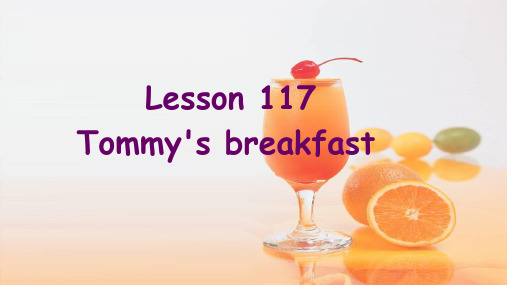
type letters What were you doing when he arrived?
I was typing letters when he arrived .
shave What were you doing when he arrived?
When he arrived I was shaving.
• have been to去过某地,已经回来了 • have gone to去过某地,还没有回来
have breakfast
knock at the door
What was she doing?
What happened?
Sshe was having breakfast. The man knocked at the door .
when
cook a meal What were you doing when he arrived? I was cooking a meal when he arrived When he arrived I was cooking a meal.
watch television What was he doing while you were cooking dinner?
While I was cooking the dinner, he was watching television.
clean his shoes What was he doing while you were cooking dinner?
wash the dishes What were you doing when he arrived? I was washing the dishes when he arrived .
- 1、下载文档前请自行甄别文档内容的完整性,平台不提供额外的编辑、内容补充、找答案等附加服务。
- 2、"仅部分预览"的文档,不可在线预览部分如存在完整性等问题,可反馈申请退款(可完整预览的文档不适用该条件!)。
- 3、如文档侵犯您的权益,请联系客服反馈,我们会尽快为您处理(人工客服工作时间:9:00-18:30)。
【注释】has/have been to 去过···(现在不在那了) three times 三次, 基数词(3或3以上)+times 表示次数; 一次once,两次twice。
课文学习 1、When my husband was going into the dining room this morning,he dropped some coins on the floor.今天早晨我 丈夫走进饭厅时,把一些硬币掉地上了。
【分析】此句是复合句,when引导时间状语从句,句子 结构完整,成为从句。主句为he dropped some coins on the floor. 从句用过去进行时,主句为一般过去时,表示过去某一动 作正在进行的同时,又发生了另外的情况。 【例如】When I was doing my homework, my father came home from work. 当我正在做作业的时候,爸爸下班回家了。
Alungry. 我们都饿了。
5.“How is Tommy?” he asked.“汤米怎么样?”他问。 【分析】“How is Tommy?”是he asked的直接引语。直接 引语中没有人称、时态和数的变化,但是在时间引语中 则有人称、时态和输的变化。 间接引语: He asked how Tommy was. 【例句】你想要一杯茶吗?”他问。
她正在打扫房间的时候,她的丈夫来电话了。
While the children were playing in the garden ,it began to rain.
正当孩子们在院子里玩的时候,天开始下雨了。
4.We both tried to get the coins, but it was too late.我们俩 都试图把这两枚硬币拿出来,但太迟了。 【注释】both 表示“两个都···”,如: They both want to go to France. 他们俩都想去法国。 【联记】三者或三者以上都用all。这两个词都用在人称代 词之前时必须加of,即both/all +of+人称代词宾格: Both of you are right. =You are both right. 你们俩都是对的。
2.We looked from them, but we could not find them all. 我们虽然找了,但没能把他们全部找到。 【分析】由转折连词but连接的并列句。but之后往往表 示与前文中内容相反的信息。 【注释】look for寻找(强调动作和过程);
find找到(强调寻找的结果)
“Would you like a cup of tea?” he asked. 她问她妈妈:“我的书包在哪里?”
She asked her mother:“ Where is my bag?”
6.Tommy’s been to the toilet three times this morning, but I haven’t had any change yet!今天上午Tommy去了三次 厕所了,但我还没看到硬币! 【分析】but连接的并列句,three times 作前一个分句的 频度状语。
Lesson 117
Tommy’s breakfast
单词学习 1.mouth n.嘴 张开你的嘴。
Open your mouse. Don’t talk with your mouth full! 嘴里塞满食物时不要说话!
Shut your mouth! (口语)闭嘴!
【惯】 from mouth to mouth 口口相传地
【注释】1.go into“走进”,强调进入的动作,反义词go out of走出···· 2.drop,掉下: Be careful!Don’t drop the vase. 小心,别把花瓶摔了。 drop,丢失,丢掉: I dropped my pen on the way home. 回家路上我把笔弄丢了。
She was looking for her passport yesterday. 昨天她在找他的护照。 Did she find it? 找到了吗? Yes,she find it under the chair. 找到了,他是在椅子地下找到的。
3.While we were having breakfast, our little boy , Tommy, found two small coins on the floor.正当我们吃早饭时,我 们的小男孩汤米在地上找到了两枚小硬币。 【分析】主从复合句,while 引导时间状语从句, Tommy 作our little boy 的同位语。 【例句】While she was cleaning the room, her husband telephoned her.
The story was passed on from mouth to mouth. 这个故事口口相传。
from hand to mouth 勉强糊口。 Life was too hard for my grandfather before liberation. He could just live from hand to mouth. 解放前爷爷的生活境况很差,只能勉强糊口。
2.swallow v.吞···咽··· She swallowed some milk. 她咽下几口牛奶。 He swallowed (up) the medicine with water. 他把药和水一起吞下(用水把药吞下)。
n.一口,一吞之量 He took a swallow of beer and kept talking. 他喝了口啤酒然后又继续说话。 She was so thirsty that she emptied the bottle of water at one swallow. 她渴极了,把那瓶水一饮而尽。
